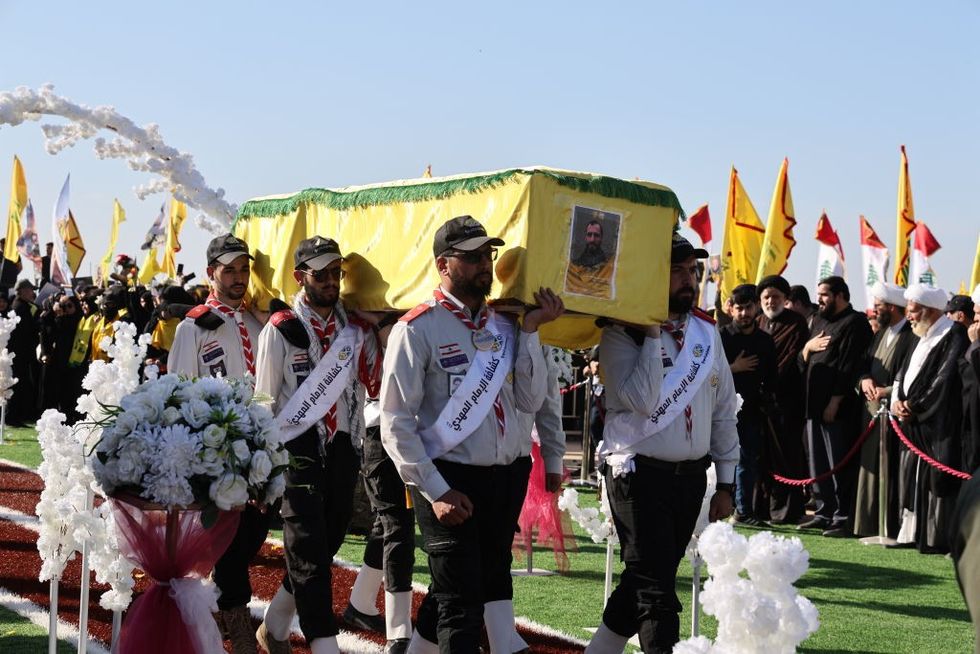Keir Starmer reacts to Iran's attack on Israel and urges Brits in Lebanon to leave the country
GB News
OPINION: Lebanon has the chance to rise from turmoil with the help of Britain and its allies, says Daniel Kawczynski.
Don't Miss
Most Read
Trending on GB News
Britain’s interactions with the Middle East span centuries, rooted in historical events such as the Crusades and the expansion of colonial ambitions during its endeavours in India. Historically, Britain sought to protect trade routes between its Indian colonies by forging alliances across the Gulf and the Mediterranean. Today, Britain, along with the US, continues to play a stabilizing role in the region, and maintains permanent sovereign bases in Cyprus and the Gulf. These unique bases symbolize Britain’s geopolitical obligations, serving as the backbone for ensuring stability and security in the Middle East. As a permanent member of the United Nations Security Council, alongside other major nations, Britain bears an enduring responsibility not only to the continent but also to safeguarding peace and preventing conflict among neighbouring nations.
Currently, the Middle East faces a severe decline due to political strife, civil wars, and dysfunctional governance exacerbated by clan rivalries and proxy politics. This deterioration is evident in the challenges faced by Arab League member states.
President Donald Trump’s pragmatic approach highlighted the failure of previous US administrations and European governments to address these crises effectively. An example of this is the lack of a clear policy in combating acts of terror by the Houthi rebels, who have disrupted international shipping routes through the Red Sea. Notably, while only 3% of American international shipping utilizes the Suez Canal, over 40% of European shipping relies on this critical waterway. Despite this, Europe has fallen short in preventing Houthi terrorist activities, hampered in part by lingering imperialistic guilt.
As an advocate with 19 years of parliamentary experience and a special interest in Middle Eastern affairs, I was among the first publicly to endorse the Gulf Cooperation Council (GCC) initiative, led by Saudi Arabia, to take military measures against the Houthi rebels. The late Margaret Thatcher, often referred to as the ‘Iron Lady,’ demonstrated the clarity and wisdom to position Britain as a global leader in addressing political challenges, including those in the Middle East. In contrast, the current British leadership lacks both global awareness and a nuanced understanding of international crises, jeopardizing Britain’s strategic interests worldwide.

The UK has been handed a unique opportunity to end terrorism in the Middle East - Daniel Kawczynski
GB News/Getty Images
Britain’s last major military operation without US involvement occurred during the Libyan uprising in 2011 alongside France. While initially celebrated for the downfall of Gaddafi, the subsequent chaos plunged Libya into a devastating civil war, far bloodier than the conflict against Gaddafi himself. Britain’s intervention in the Suez Crisis of 1956 similarly ended in failure due to poor handling. These historical missteps underscore the importance of strategic foresight and international partnerships.
The bond between Britain and the US, cemented by historical figures such as Winston Churchill, remains crucial in navigating global challenges. For example, collaboration
between British forces, the US, and GCC allies - such as Saudi Arabia, the UAE, Bahrain, and Kuwait - can effectively counter the Houthi threat using bases in Cyprus and aircraft carriers stationed in the region. The Houthis, a ruthless terrorist organization supported by Iran, have seized control of Yemen, destabilizing the broader region.
In recent months, Iran has been weakened following the decline of the Assad regime in Syria and targeted actions against Hezbollah by Israeli forces. This situation presents an opportune moment for Britain to collaborate with allies, including the US and Israel, to address Hezbollah’s threat in Lebanon. Despite internal divisions, many Lebanese citizens oppose Hezbollah, and recent defeats of its leaders - such as Hassan Nasrallah - highlight an opportunity to eradicate terrorism in Lebanon. However, disarming Hezbollah remains a complex challenge, as elements within Lebanon’s national army share affiliations with Hezbollah fighters, complicating internal military actions.

Hezbollah buries 15 members killed in Israeli attacks before ceasefire.
Getty Images
The Trump administration has supported Lebanese efforts to disarm Hezbollah, but Lebanon lacks the resources to act decisively without risking civil war. Similarly, Shia minorities funded by Iran have sparked armed conflicts in Yemen, Iraq, and Syria. Britain’s unique leverage and strategic positioning can serve to bolster coordinated international efforts to address these challenges.
Following the October 7 massacre in South Israel, military confrontations erupted between Hezbollah and Israel, although it is critical to differentiate this from broader Lebanese support for Hezbollah. Britain and its allies have a unique opportunity to support Lebanon in eradicating terrorism and fostering resilience. Despite the adversities, Lebanon has the potential to rise from turmoil, much like the phoenix. Wise governance, communal harmony, and robust policy implementation can help the nation regain stability and stand tall, symbolized by its national emblem, the cedar tree. As Khalil Gibran eloquently posited, ‘Your soul is oftentimes a battlefield,’ a reminder that overcoming adversity is the key to true strength.
In my view, the summary could adopt a more incisive tone and critically examine the question, ‘To what extent is Lebanon committed to the eradication of Hezbollah?’ While the involvement of the UK, alongside other international and regional actors, is undoubtedly significant in fostering progress, it is imperative to evaluate what concrete measures the new administration has implemented to initiate the process of disarming Hezbollah.’







